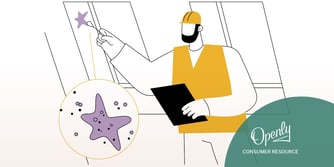Homeownership is a dream come true for many. It's a place where we create lasting memories, build our lives, and find refuge from the world's hustle and bustle. However, owning a home also comes with responsibilities, and one crucial aspect often overlooked is homeowners insurance.
In this article, we'll answer questions like, "Can I own a home without homeowners insurance?", “Is homeowners insurance required?”, and "Do you have to have homeowners insurance?”. So let's dive into the world of homeowners insurance, exploring why it's essential, what types you need, how much is necessary—and the risks of going without it.
At a glance:
- Different types of homeowners insurance coverage including dwelling, personal property, liability, and more, are critical for comprehensive protection.
- Determining the right coverage amount depends on factors like your home's replacement cost, personal property value, and liability risks.
- It's crucial to secure homeowners insurance before unexpected events occur to avoid financial and emotional stress.
Is homeowners insurance required?
The short answer is no, homeowners insurance isn't legally required for you to own a home. However, there are compelling reasons why you should consider having it.
Legal reasons
While there may not be a law mandating homeowners insurance, there are often legal obligations tied to it.
For instance, if you have a mortgage on your home, your mortgage lender will likely require you to have homeowners insurance.1 This is because your home serves as collateral for the loan, and the lender wants to protect its investment. Not having homeowners insurance when it's required by your lender can lead to a breach of your mortgage agreement, potentially triggering financial penalties or even foreclosure. So, while the law doesn't force you to have homeowners insurance, your lender might.
Financial reasons
Even if you own your home outright, the financial reasons for homeowners insurance are compelling. Think about the replacement cost of your home, your personal property, and the potential liability you might face.
- Could you afford to rebuild your home if it were destroyed in a fire or damaged in a storm?
- Would you have the funds to replace all your belongings after a burglary?
Homeowners insurance provides financial protection against these and other unexpected (but covered) perils. It helps cover the costs of repairing or rebuilding your home, replacing personal property, and even legal expenses if someone is injured on your property and sues you. Without a homeowners policy, these costs can quickly add up and potentially drain your savings or lead to financial ruin.
Security reasons
Beyond legal and financial considerations, homeowners insurance offers peace of mind and security. Knowing that you're protected in case of a disaster or a lawsuit can significantly reduce stress and anxiety. It allows you to enjoy your home without constantly worrying about the "what-ifs."
While homeowners insurance may not be legally mandated in most cases, it's practically a necessity to safeguard your financial well-being and provide a sense of security in the place you call home.
What kind of homeowners insurance is needed?
Now that we've established why homeowners insurance is essential, let's discuss the types of coverage you should consider.
Dwelling coverage
Dwelling coverage, or Coverage A, is the core of homeowners insurance. It protects the structure of your home, including the walls, roof, floors, and foundation, against various perils specified in your policy such as fire, windstorm, hail, vandalism, and more. This coverage ensures that you can repair or rebuild your home if it's damaged or destroyed.
Other structures coverage
Other structures coverage extends protection to structures on your property that aren't attached to your home, such as a detached garage, toolshed, or fence. It's typically a percentage of your dwelling coverage amount and can be crucial if you have valuable structures on your property. For instance, if a tree falls on your detached garage, other structures coverage can help cover the repair or replacement costs.
If there are any other structures located on your property, be sure to review your policy to confirm whether or not it adequately covers all structures. Contact your insurance agent to discuss adjusting your policy coverage levels if you identify any coverage gaps.
Personal property coverage
Your personal belongings are essential to your comfort, lifestyle, and well-being; and personal property coverage helps safeguard them. This personal property insurance protects your possessions, whether they're inside your home or temporarily away from it. It includes items like furniture, electronics, clothing, and more. Keep in mind that some high-value items, such as jewelry or collectibles, may have sub-limits in your policy. You may need to purchase additional coverage for these items.
Personal liability coverage
Personal liability coverage is your financial shield against lawsuits. It helps cover legal expenses, medical bills, and damages if someone is injured on your property, and you're found responsible. It can also extend beyond your property, providing protection if you or a covered family member cause injury or property damage to others outside your home.
Medical payments coverage
Medical payments coverage is designed to cover minor medical expenses for guests who are injured on your property, regardless of fault. This coverage can help avoid legal disputes and encourage a quick resolution to medical bills, enhancing your home's reputation as a safe place.
Additional living expenses
In case your home becomes uninhabitable due to a covered loss, additional living expenses coverage steps in. It covers expenses like hotel bills, restaurant meals, and other costs associated with temporarily living away from home while it's being repaired or rebuilt. This coverage ensures that you can maintain your standard of living even when your home is undergoing repairs. Review your policy to understand the limits and duration of this coverage.
How much homeowners insurance is needed?
Determining the right amount of coverage you want in the homeowners insurance policy can be challenging, but it's essential to ensure you're adequately protected.
Assess your home's replacement cost
Your dwelling coverage should be sufficient to cover the cost of rebuilding your home if it's damaged or destroyed. The amount of coverage is typically determined by either the market value, purchase price, or other characteristics associated with establishing the value of the dwelling, which impacts the replacement cost.2 Replacement cost is the amount it would require to replace or rebuild the home without accounting for depreciation.
When determining the amount of dwelling coverage you should obtain, be sure to consider factors like construction costs, labor, and materials specific to your area. You might also want to consider consulting with a professional appraiser before obtaining a home insurance policy to ensure your coverage is adequate.
Calculate personal property value
For personal property coverage, creating a detailed home inventory that includes all your belongings is crucial. Document each item's value, and don't forget to include high-value items that might require additional coverage. Keep records, photos, and receipts in a safe place, so you have proof of ownership in case of a claim.
If over the course of your inventory, you have identified high-value items, consider scheduling items for additional protection or securing blanket coverage.
Consider liability protection
Personal liability coverage should be enough to protect your assets in case of a lawsuit. If you have significant assets, you may want to consider an umbrella policy, which provides additional liability coverage beyond your homeowners insurance coverage limits.
Consult with an agent
Determining the right coverage limits can be complex, as it depends on various factors unique to your situation. To get a precise estimate tailored to your needs, it's advisable to consult with an experienced insurance agent. They can assess your specific risks and recommend the appropriate coverage levels.
When is homeowners insurance needed?
The need for homeowners insurance starts as soon as you take ownership of your home. Ideally, you should secure coverage before or on the day of your home's closing. This ensures that you're protected from day one of homeownership. Waiting until a disaster occurs can leave you vulnerable and without the necessary protection.
Risks of not having homeowners insurance
Choosing not to have a homeowners insurance policy is a risky proposition that can have dire consequences. Some of the risks you could face include:
- Financial ruin—Without homeowners insurance, you're personally responsible for covering the cost of repairing or rebuilding your home if it's damaged or destroyed.
- Loss of personal belongings—Without personal property coverage, you'd have to bear the full cost of replacing everything out of pocket in the event of a loss.
- Legal battles—Personal liability coverage can help protect your assets and provide the resources needed to defend yourself in court, if someone is injured on your property and sues.
- Emotional stress—Homeowners insurance not only provides financial protection but also peace of mind, allowing you to focus on rebuilding and moving forward.
Get homeowners insurance with Openly
Now that you understand the importance of homeowners insurance, you might be wondering where to get the right coverage for your home. Openly offers comprehensive homeowners insurance with various coverage options to meet your specific needs.
With Openly, you can tailor your homeowners insurance policy to match your unique situation. Whether you're a first-time homeowner or have years of experience, we offer coverage options that provide the protection you need.
Talk to a local agent
Finding the right homeowners insurance can be a daunting task, but you don't have to do it alone. Openly works with a network of local agents who understand the specific risks in your area. They can provide personalized guidance and help you choose the right coverage for your home.
While homeowners insurance may not be legally required in most cases, it's a vital tool to protect your home, personal property, finances, and peace of mind. Don't wait until it's too late; secure the right homeowners insurance today to ensure a secure and worry-free future for you and your family.
* We provide this information to help you understand insurance. Any coverage is subject to the terms of your policy. Please refer to your policy and declaration page for complete coverage details.
1 Consumer Financial Protection Bureau. “What is homeowner's insurance? Why is homeowner's insurance required?” CFPB. Published 9 September 2020. Accessed 16 October 2023. https://www.consumerfinance.gov/ask-cfpb/what-is-homeowners-insurance-why-is-homeowners-insurance-required-en162/#:~:text=When%20you%20have%20a%20mortgage,possible%20to%20add%20this%20coverage
2 Leslie Kasperowicz. “How to calculate replacement cost for homeowners insurance” Insurance.com. Published 3 November 2023. Accessed 16 November 2023. https://www.insurance.com/home-and-renters-insurance/coverage/how-to-calculate-home- replacement-cost-value




